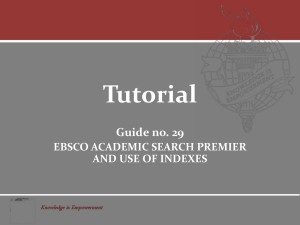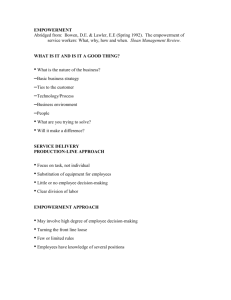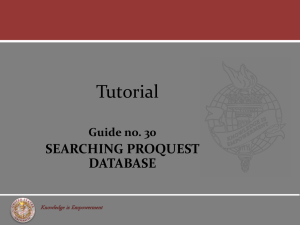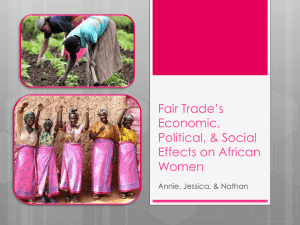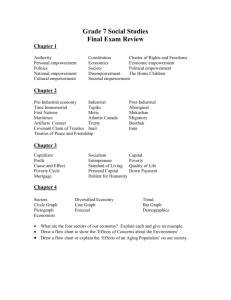Fundamentals of Information Literacy
advertisement
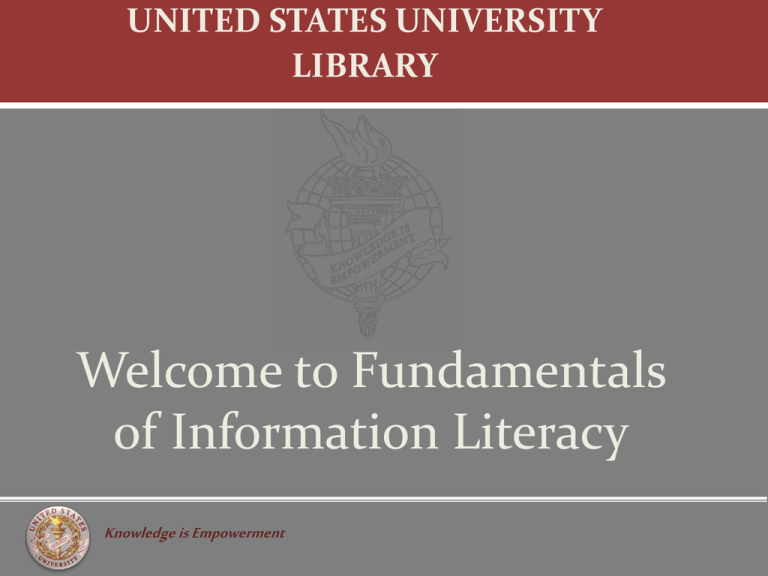
UNITED STATES UNIVERSITY LIBRARY Welcome to Fundamentals of Information Literacy Knowledge is Empowerment CONTENTS I. II. III. IV. V. VI. VII. APA Style in Academic Articles… Slide 3-7 EBSCO- Academic Search Premier & Nursing Reference Center… Slide 8-12 ProQuest- Nursing & Allied Health...Slide 13-16 JSTOR-Language and Literature- Arts & Sciences. …Slide 17-18 Internet Search Engines- URL & Google Scholar, Opendoar, Doaj & Oaister… Slide 19-26 Tutorial links… Slide 27 Plagiarism… Slide 28-31 Knowledge is Empowerment I. APA Style in Academic Articles • US University Guide to APA Style emphasis in electronic sources (Select Tutorials from Student Resources) • The guide is based on the principles mentioned in the Publication Manual of the American Psychological Association (APA), sixth edition (2010), and from Robert Perrind ideas in his Pocket Guide to APA Style, 3rd edition. • http://www.apastyle.org/ On this site, you will find tutorials, FAQs, and other resources to help you improve your writing, master APA Style, and learn the conventions of scholarly publishing. http://www.apastyle.org/learn/index.aspx Knowledge is Empowerment Citing multiple authors & one work, using parenthetical format at the end of the sentence: 2 Authors 3,4,5 Authors 6 or more Authors Groups: corporations, associations, study groups No author First time in text citation (Boysen & Bogel, 2009) (Swim, Hyers, Cohen, & Ferguson, 2001) (Sue et al., 2007) (National Science Foundation, 2009) (United States University, 2010) Subsequent citations (Boysen & Bogel, 2009) (Swim et al., 2001) Write a short version of the title, the first 2 to 5 words, use double quotations (“Guide no. 14: Writing Essays”, 2010) (“Guide no. 14: Writing Essays”, 2010) Knowledge is Empowerment (Sue et al., 2007) (NSF, 2009) (United States University, 2010) Apply the same principle when the author appears as part of the narrative First time in text citation Boysen & Bogel (2009) Subsequent citations 3,4,5 Authors Swim, Hyers, Cohen, & Ferguson (2001) Swim et al. (2001) 6 or more Authors Sue et al. (2007) Sue et al. (2007) Groups: corporations, associations, study groups National Science Foundation (2009) United States University (2010) NSF (2009) United States University (2010) No author Guide to APA style (2010) Guide to APA style (2010) 2 Authors Knowledge is Empowerment Boysen & Bogel (2009) Quotations • When quoting, always remember the following: • “If the quotation comprises fewer than 40 words, incorporate it into the text and enclose the quotation in double quotation marks” (APA, 2010, pp.170-172). • If the quotation comprises 40 or more word, display it in a freestanding block of text and omit quotation mark. Start such a block quotation on a new line and indent the block about a half inch from the left margin (in the same position as a new paragraph (APA, 2010, p.171). Knowledge is Empowerment Reference List (APA, 2010, pp.198-215). Prepare the entries of all the documents following order and punctuation of the example below, the colors separate each data: • Author last name, Initial. (Year of publication). Title of the article. If the document is a book, the title is in italics. Title of periodical or Journal in italics, write the volume number also in italics (issue number), page from-to page. Retrieved date, from name of database, or Digital Object Identifier (DOI) or the URL of the article, if it was retrieved from the internet. • Robson, L. (2010). The superego speaks. New Statesman, 139(4986), 4445. Retrieved from Academic Search Premier Database. • Stupnisky, R. H., Renaud, R. D., Daniels, L. M., Haynes, T. L., & Perry, R. P. (2008). The Interrelation of First-Year College Students' Critical Thinking Disposition, Perceived Academic Control, and Academic Achievement. Research In Higher Education, 49(6), 513-530. Retrieved from ERIC. To ask for APA help , please go to http://smarthinking.com/ and request from Emily Munic the password (619-477 6310 X2038. Also see tutorial s: US University Guide to APA Style emphasis in electronic sources or purchase the PublicationKnowledge Manualis of the American Psychological Association. 6th ed. 2010. Empowerment ISBN 9781433805615. Publisher: American Psychological Assoc. To ask for APA help , please go to • http://smarthinking.com/ and request from Emily Munic the password (619-477 6310 X2038. • Also see tutorials: US University Guide to APA Style emphasis in electronic sources . • Ten tips in how to search EBSCO, slide 16. • or purchase the Publication Manual of the American Psychological Association. 6th ed. 2010. ISBN 9781433805615. Publisher: American Psychological Assoc. • Contact the Librarian clopez@usuniversity.edu Knowledge is Empowerment II. EBSCO- Academic Search Premier. This multi-disciplinary database provides full text for more than 4,600 journals, including full text for nearly 3,900 peer-reviewed titles. PDF back files to 1975 or further are available for well over one hundred journals, and searchable cited references are provided for more than 1,000 titles. The Academic Search Premier (ASP) is being search by students and faculty from all disciplines. It is important you learn how to search it before you start the session. Follow the tutorials prepared by USU Librarian or by EBSCO host. You are invited to visit the Library, Students Resources and Tutorials http://www.usuniversity.edu/library/database-tutorials/ After you have registered in any EBSCO database, please select the Help icon and learn how to search from the Knowledge is Empowerment tutorials Now, let’s learn the steps to access USU databases: please go to our site http://www.usuniversity.edu and select Library (1). Click on Full Text Database Nursing or any College (2). Select Academic Search Premier EBSCO(3) and register (4). 1 3 4 2 Knowledge is Empowerment • • Ask the USU librarian for ID & Password. From your USU • email to clopez@usuniversity.edu Then let’s select the databases related to our information need by checking on each box. You can search EBSCO databases simultaneously , all in one search. Please click Choose databases •The above example is for searches related to Nursing and Health Science: CINAHL, PSYCARTICLES, ACADEMIC SEARCH PREMIER and MEDLINE. •If the search is related to history, art, literature, science, select ACADEMIC SEARCH PREMIER, it is multidisciplinary and one of the best database in EBSCO. •If the search is related to education, select ACADEMIC SEARCH PREMIER, ERIC (education database) and PSYCARTICLES •If the search is related to business, select ACADEMIC SEARCH PREMIER, BUSINESS SOURCE ELITE, PSYCARTICLES & REGIONAL BUSINESS NEWS Knowledge is Empowerment •If the search is related to business in healthcare, select all. The screen opens automatically to the advanced search option: Type the word, term, keyword, the title of the article, or the last name of the author. Remember to choose the correct field to limit your results. For example: Search for articles on critical thinking and college students and choose the field TI Title. Click the full text box and click search at the bottom of the page. Knowledge is Empowerment Using the Boolean operator AND we searched for words or phrases that appear together while using OR as a second operator allows us to search for similar words and synonyms. Using quotation marks in words, it limits your results. Select peer reviewed, full text and search. In the next slide you will learn how to select the field. Knowledge is Empowerment For more instructions go to Tutorials: EBSCO simple search using boolean operators III. PROQUEST Nursing & Allied Health. please go to College of Nursing Full Text Database(1). Scroll down to select Proquest Nursing & Allied health Source (2) and login (3). 4 1 1 2 3 • • Ask the USU librarian for ID & Password. From your USU • email to clopez@usuniversity.edu Knowledge is Empowerment III. PROQUEST NURSING AND ALLIED HEALTH SOURCE database. After entering ProQuest through USU Library, the screen below appears. For now, we will search for the article using the basic search. As you become more comfortable in the future, search for articles using the advanced, figures & tables, and publications tabs. Knowledge is Empowerment Here, the subject term or the article’s title is inserted in the basic search text box. In the limit results area check ―Full text and ―Scholarly journals. Full text shows full articles, if they are available, and not just abstracts. Next, click Search Knowledge is Empowerment The screen below shows the results from the basic search. There are thousands of results from our search. The first article is an exact match of what we are looking for, so let’s use this one. 1. Click full text 3. Email, print or request the APA citation 2. Select your articles See more literature. Do you need Theses? Knowledge is Empowerment To learn how to search, please see tutorials: Searching PROQUEST database IV. JSTOR is a multidisciplinary database and a great source if you are searching for articles in history, anthropology, language, literature, art or science. More than 150 journals full text are indexed. • Knowledge is Empowerment Things to remember: – Ask for JSTOR access – Register first (log in) – Search only terms, nouns, keywords, dates, authors – Check “Only content I can access – Green mark means full text – The citation is not in APA format To Learn how to search , please go to tutorials: IV. JSTOR is a multidisciplinary database and a great source if you are searching for articles in history, anthropology, language, literature, art or science. More than 150 journals full text are indexed. • To save Citations, Journals Alerts, Search Alerts, please register in My for my JSTOR To e-mail citations, first select the articles and then click the e-mail icon Knowledge is Empowerment Things to remember: – Ask for JSTOR access – Register first (log in) – Search only terms, nouns, keywords, dates, authors – Check “Only content I can access – The citation is not in APA format V. Internet Search Engines: URL & Open Sources (Google Scholar, OPENDOAR, OAISTER) • The Internet has hundreds of search engines to assist such as DOAJ, Oaister, BioMed Central, WEB MD, WHOLIS, RXlist, ENTREZ, HIGHWIRE Press, Google books, Google Scholar, etc. • Consider the source when using the Internet: • –Is the source credible? (Nationally recognized & academic- peer review journals). • –Keep in mind that almost anything one can imagine may be found on the Internet and non credible material as well Knowledge is Empowerment By identifying the domain in the URL, you know what University, Institution or Government Agency is responsible of the document and therefore the information’s credibility. Uniform Resource Locator (URL) The URL is important because it tells the reader the EXACT location you retrieved the information. However, there is a structure to the URL. Let’s examine the structure of the URL from the previous slide: http://scholar.google.com/?hl=en http: The Internet protocol that sends information from the server to the computer Scholar . google: 1st part of the domain name identifying Google Scholar as the host for the specific web page com: 2nd part of the domain known as the top level domain. This informs the user of the type of organization, commercial. Can you guess what .edu denotes? Right, educational institution ! Unfortunately, when conducting Internet research the domain name alone may not provide enough information for the reader to retrieve the source. So...next slide, please! Knowledge is Empowerment •Google Scholar Keep it simple when searching the Internet: look at dates, sources and full text. Domain : journal (BMJ) and Type of Organization: (com) commercial Domain (University of Virginia) and Type of Organization : (edu) education Please filter your results by year and checking (pdf= full text), the domain and organization. Knowledge is Empowerment Example Google Scholar: Critical thinking and online education + 2014 Search using terms, see Tutorials http://www.usuniversity.edu/library/database-tutorials/ Research Topics and Terms Texas Digital Library Journal of Educational Technology & Society Knowledge is Empowerment Do not forget to copy/paste the URL of the article; you will need it for your APA citation. Remember that Google Scholar is not a data base like PROQUEST, EBSCO, JSTOR & ACCESS MEDICINE. The domain http://jme.bmj.com/content/2 5/5/394.full.pdf+html Journal of Medical Ethics The domain http://www.annals.org/content/146/9/666.full?ijkey=9ed3ff975 41931accaa7959397f7c13b83d9e333 By the American College of Physicians Knowledge is Empowerment Learn how to cite an article retrieved from Google Scholar Vs. a Database • • • • • • Google Scholar: Lynn, J., Baily, M., Bottrell, M., Jennings, B., Levine, R., Davidoff, F., et al. (2007). The ethics of using quality improvements methods in health care. Annals of Internal Medicine, 146(9), 666-673. Retrieved from http://www.annals.org/content/146/9/666.full?ijkey=9ed3ff97541931accaa7 959397f7c13b83d9e333 Copy & paste the URL Also, typing or pasting the URL in the address bar takes the reader to the article. Before going to the next slide to see how I retrieved the article, type or paste the URL in the address bar and see if it works for you. Database: Robson, L. (2010). The superego speaks. New Statesman, 139(4986), 44-45. Retrieved from Academic Search Premier Database. Type the Database name Knowledge is Empowerment Open Sources: OPENDOAR, DOAJ & OAISTER, are good sources when searching for multicultural information • • • • • • • OPENDOAR = Directory of Open Access Repositories. http://opendoar.org/ 2714 repositories 09/10/14 Full Text articles, theses, Documents. • • • • • • DOAJ= Directory of Open Access Journals http://doaj.org/ 9,982 Journals 5,859 searchable at Article level 134 Countries 1,718,686 Full Text Articles Knowledge is Empowerment OAISTER is a world wide library network sharing full text information: http://oaister.worldcat.org/ To learn how to access “Open Sources” see tutorial OPEN SOURCES The search is: History of California Missions. Please see under formats and select, specially the electronic ones: e-books, downloadable visual material Knowledge is Empowerment USU Database Tutorials. Visit http://www.usuniversity.edu/library/databasetutorials/ • Basic tutorials to all programs • Nursing and Arts & Science= Basic + Searching Medline Register EbscoHost Alerts Welcome to Fundamentals of Information Literacy Introduction to how to find articles from USU databases Research Topics and Terms Ten tips in how to search EBSCO Searching PROQUEST database EBSCO simple search using Boolean operators Advance Search in ERIC and limit your results Searching for information at the master level for MSN and MSHS Searching ERIC Thesaurus & Index Search EBSCO ASP for Management Create Alerts and Files in EBSCO EBSCO Academic Search Premier and use of subject Term Use of Indexes in EBSCO database Searching JSTOR US University Guide to APA Style emphasis in electronic sources OPEN SOURCES What you should know about copyright Plagiarism Knowledge is Empowerment • Education & Management = • Basic + Searching ERIC Thesaurus & Index Advance Search in ERIC and limit your results Search EBSCO ASP for Management VI. PLAGIARISM What is plagiarism? A. Webster (www.webster.com ) defines plagiarize as: • To steal and pass off (the ideas or words of another) as one's own: use (another's production) without crediting the source (transitive verb) • To commit literary theft: present as new and original an idea or product derived from an existing source (intransitive verb) B. According to the Publication Manual of the APA 6th Edition & MLA Handbook (Gibaldi, 2003) there are several forms of plagiarism: 1. Claiming the words and ideas of another as their own 2. Obtain and submit as your own a paper written by someone else Knowledge is Empowerment Some wise advice: 3. Repeating or paraphrasing wording 4. Taking a particularly apt phrase 5. Paraphrasing an argument or presenting a line of thinking C. Please review the US University definition and policy regarding plagiarism at: US University Catalog p. 25-26. http://www.usuniversity.edu/downloads/USU_Catalog.pdf 1)Click on the link above, then in the Table of Contents, see or Click ―Student Conduct OR 2)Copy and paste the link above in your address bar and press enter on the keyboard Knowledge is Empowerment Plagiarizing according to the MLA handbook (Gibaldi, 2003) You have plagiarized if: –You took notes that did not distinguish summary/paraphrase from quotation and then presented wording from the notes as if it were all your own –While browsing the web, you copied text and pasted it into your paper without quotation marks or without citing the source –You presented facts without saying where you found them –You took someone else’s unique or particularly apt phrase without acknowledgment –You paraphrased someone else’s argument or presented someone else’s line of thought without acknowledgement –You brought or otherwise acquired a research paper and handed in part or all of it as your own Knowledge is Empowerment Avoiding plagiarism Avoiding plagiarism according to the MLA handbook (Gibaldi, 2003) You can avoid plagiarizing by: –Making a list of writers and viewpoints you discovered in your research and double checking the presentation material in your paper –Keeping the following categories distinct in your notes: (a) your ideas, (b) your summaries of others’ materials, and (c) exact wording you copy –Identifying the sources of all borrowed material—exact wording, paraphrases, ideas, arguments, and facts –Checking with your Professor when you are uncertain about your use of sources. O.K., now that we’re clear on the fundamentals of ProQuest, EBSCO, ACCESS MEDICINE & JSTOR access, Internet use, and plagiarism, let me provide just a few tips to make your Information Literacy journey at US University even more enjoyable Knowledge is Empowerment For more information • Please contact • M.L.S Catalina Lopez • clopez@usuniversity.edu • (619) 477 6310 ext. 2017 Knowledge is Empowerment
